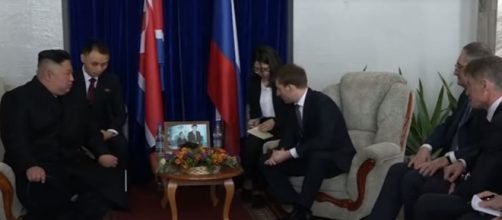Kim Jong-Un's summit with Vladimir Putin will be the first between the two leaders, against a background of a diplomatic impasse with Washington over nuclear issues.
"I hope this visit will be successful and useful," he said in the morning on Russian state news channel, Rossiya 24 shortly before arriving in Vladivostok.
The meeting, scheduled for Thursday, will be Kim Jong-un's maiden meeting with a foreign head of state since his return from Hanoi, the scene, in February of a resounding diplomatic fiasco with US President Donald Trump.
Earlier in the morning, the North Korean leader arrived in the Russian city of Khassan, bordered by North Korea and China, where the local Russian media reported that he was traditionally welcomed with bread and salt by jubilant women in folk costumes.
Moscow in support of Pyongyang
The official Korean news agency, KCNA, announced Kim Jong-un's departure by train, also mentioning the presence on board of his foreign minister, Ri Yong Ho, who assured reporters after Hanoi that North Korea's position would "never change."
These talks are a response to multiple invitations sent by Vladimir Putin since Kim Jong-un launched last year in a significant diplomatic offensive.
Moscow advocates dialogue with Pyongyang based on a roadmap set by China and Russia. The latter has already called for the lifting of international sanctions, while the United States has accused it of helping Pyongyang to circumvent them.
"The meeting will focus on the politico-diplomatic resolution of the nuclear issue on the Korean peninsula," Yuri Ushakov, an adviser to the Kremlin, told reporters, adding that Russia intended to "support" any "positive" developments in this area.
Do not depend on a single ally
Yuri Ushakov said the summit would begin with a meeting between Kim Jong-un and Vladimir Putin before it takes "an expanded format" without further details. Neither joint communique nor signature of agreements are envisaged. The relations between Pyongyang and Moscow date back to the Soviet era: the USSR put Kim Il-Sung - the grandfather of Kim Jong-un and founder of the Democratic People's Republic of Korea (DPRK) - in power.
Relationships were however uneven during this period, especially because Kim Il-Sung excelled in the art of playing on the Sino-Soviet rivalry to obtain concessions from his two powerful neighbors.
Shortly after his first election to the Russian presidency, Vladimir Putin sought to normalize these relations and met three times with Kim Jong-il, father, and predecessor of the current leader.
The first time was in Pyongyang in 2000. He was then the first Russian leader to go to North Korea.
Beijing, however, took advantage of the Russian disengagement in North Korea to expand its role and become the closest ally of Pyongyang and, by far, its largest trading partner. Some experts believe that Kim could, this time, seek a form of rebalancing between Beijing and Moscow.
"It's part of the Juche doctrine, the self-sufficiency ideology of the North, not to depend on a single ally," says Jeong Young-tae, of the Institute of North Korean Studies in Seoul.
Degradation of relations with Washington
After years of rising tensions due to Pyongyang's nuclear and ballistic programs, the Korean Peninsula was spectacularly relaxed in 2018, in the wake of the Pyeongchang Winter Olympic Games.
And, since March 2018, Kim Jong-un has met four times with Chinese President Xi Jinping, three times with South Korean President Moon Jae-in and twice with Donald Trump.
For the experts, the North Korean leader is seeking more international support in his diplomatic face-to-face with Washington. Western diplomats argue that Russian diplomacy is motivated by "a quest for relevance" while Moscow's role in the international arena is nothing more than the shadow of what it once was.
In Hanoi, North Korea sought immediate relief from the international sanctions imposed to force it to give up its atomic weapons. But the talks were cut short because of deep disagreements with Washington, especially about the concessions Pyongyang was ready to make.
Signs of the deterioration of relations between North Korea and the United States last week, include a rare attack on violence against Mike Pompeo, asking that the US Secretary of State does not participate to the denuclearization talks. A few hours earlier, the North Koreans had claimed the test of a new weapon.


